QuestionHello,
I'm sorry if this seems to be a silly question, but one of my ferrets is slated to undergo surgery (she showed signs of adrenal disease). I'm just wondering what I will need in taking care of a "post-surgery" ferret? My vet suggested that I keep her in a seperate cage, but wasn't exactly helpful when it came to other things like what to feed her (homemade duck soup or baby food?), what to look out for, etc. Am a bit overwhelmed already with the upcoming surgery, and the thought of not knowing what to do once I bring my fuzzy home from the vet is stressing me out! Please help--any advice is greatly appreciated!
From the overwhelmed, worried first time ferret owner.
AnswerNot a silly question at all! I'm glad you love your little one so much that you want to do right by him and be prepared! You're a good ferret parent :-)
In addition to separating your baby from the others, he will need to be kept all on one flat level - no hammies, nothing he can crawl up on while his stomach stitches are healing. He will want soft blankies to snuggle down into tho. They sometimes have trouble keeping their body temperatures up post surgically, so be sure to keep him plenty warm. Also, you will want to use newspapers in the corner instead of a litterbox, so he doesn't have to step up into the litterbox and also so his little belly doesn't drag on that front part of the litterbox as he goes in and out. I keep six or eight newspaper sections stacked in the corner, and after he potties on the top, just carefully fold it inward and remove it and you automatically have a clean surface of more newspapers underneath for him to use next time. If you have puppy pads, you can use these too - I cut them in 1/4's and that's about the right size to catch a normal potty, but you have to keep up on it and keep removing the top layer each time they use it for best results.
Be sure he has fresh water he can easily get to. Usually I give my kids a 'soup' made with Hill's A/D Feline (a prescription diet you get at the vet) because it is especially easy for them to digest and is made specifically for carnivores who are sick or post surgical, with extra vitamins and easy digestability (just remember to get half a dozen cans or so when you leave the vets office with him after the surgery). Or, of course you can use your own recipe if he is used to you making soup. Hopefully he will eat on his own with a little encouragement - dip your finger into the warm soup, then rub it on his gums if he needs help getting started. It's important that they do eat within 12 hours after surgery. If he doesn't for some reason, be sure to get him back to the vet for subQ fluids.
The big things you want to watch for post-surgically, in addition to watching the surgery site to be sure the staples/stitches stay in place and the site is kept clean, is that he eats and drinks, poops and pees. Keep him warm, don't be afraid to wrap a little baby receiving blanket around him and rock him - most likely he will fall asleep and really appreciate the extra attention. Keeping food/fluids in him and keeping him warm, clean, and loved are the most important things you can do post surgically.
Most ferrets are only *down* for a day or two, even after some of the most grueling surgeries! They bounce back amazingly and you will be so relieved, I know, when you see how quickly they really do recovery. Follow your vet's instructions on when to resume 'normal' kibble feedings and keep him in the 'hospital cage' (with NO climbing of any kind) for at least 7 days post surgically.
After the first 2 days, he would probably appreciate 'visits' from his cage mates, one at a time - let them join him in the hospital cage for short visits and snuggles - it comforts him and lets them know that he is okay. You'll be surprised how concerned and gentle they are with each other!
Hopefully everything will go just fine. Make sure you know how to contact your vet after hours "just in case", monitor his eating/drinking/peeing and pooping, keep his activity level low, and his love level high and he'll be back up and to his crazy silly little self in no time at all.
And take a deep breath - these things are almost always harder on us than on them :-) (((((((hugs))))))))
jacquie

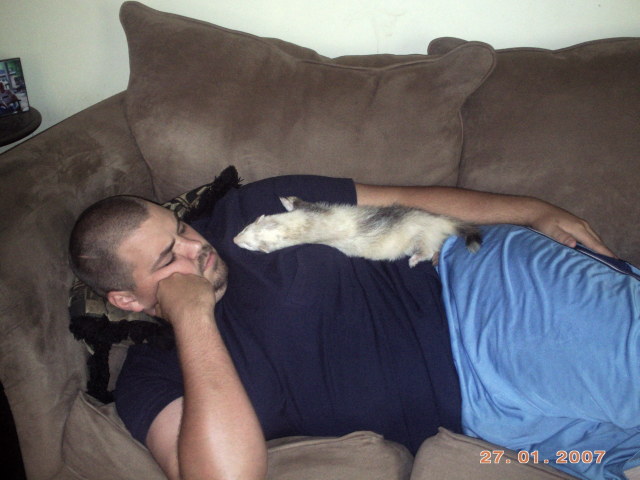 Crazy Ferret
Question
Tweedle and Drew
My son brought home a ferret
Crazy Ferret
Question
Tweedle and Drew
My son brought home a ferret
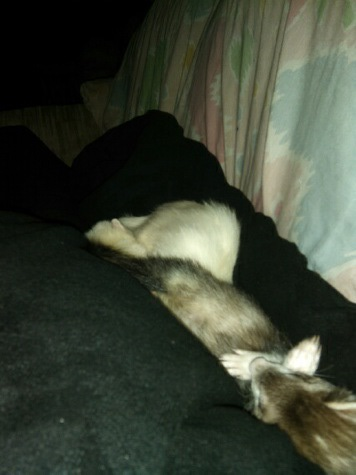 Maggots found in ferret cage?!
Question
Cloud and Bandit
So i have had my femal
Maggots found in ferret cage?!
Question
Cloud and Bandit
So i have had my femal
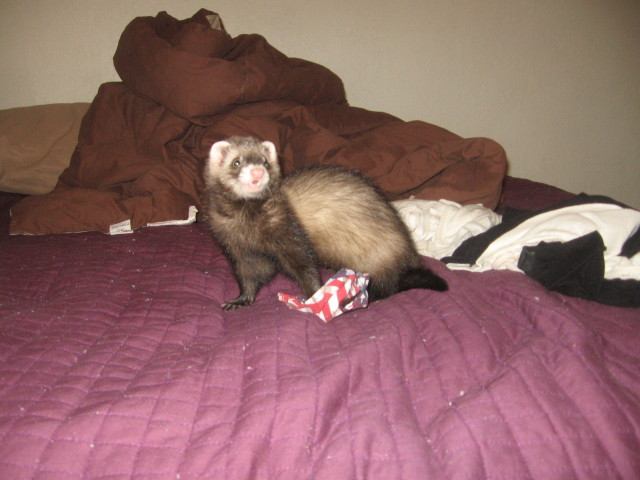 ferret ear problems
Question
I cant wait to get he
Hi Cindy!
I have a ferre
ferret ear problems
Question
I cant wait to get he
Hi Cindy!
I have a ferre
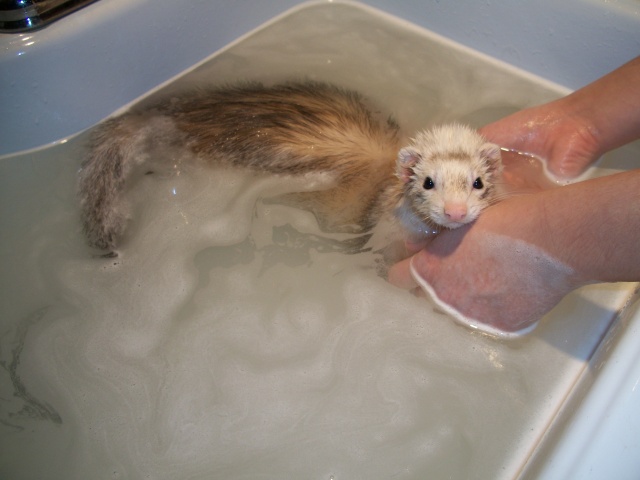 Just some basic help questions
Question
Benny!
Hi!
My ferret Benito (we just call him
Just some basic help questions
Question
Benny!
Hi!
My ferret Benito (we just call him
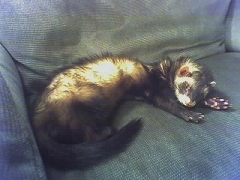 SWOLLEN FEMALE PARTS
QuestionSmokey napping
QUESTION: Hello, I have a
SWOLLEN FEMALE PARTS
QuestionSmokey napping
QUESTION: Hello, I have a